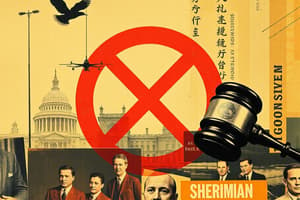Podcast
Questions and Answers
Under what conditions can the failing firm defense be applied?
Under what conditions can the failing firm defense be applied?
- The firm being acquired has no alternative buyers. (correct)
- The firm is the market leader in its segment.
- The acquiring firm operates in a different market.
- The firm being acquired has a history of profitability.
Which of the following best describes Horizontal Restraint of Trade?
Which of the following best describes Horizontal Restraint of Trade?
- Regulating pricing practices at retail outlets.
- Trade restrictions based on geographic locations.
- Price setting between different levels of distribution.
- Agreements among firms at the same level of production. (correct)
What does the Robinson-Patman Act specifically prohibit?
What does the Robinson-Patman Act specifically prohibit?
- Offering discounts for bulk purchases.
- Vertical price fixing arrangements.
- Merger-related market efficiencies.
- Predatory pricing strategies affecting competitors. (correct)
Which factor is NOT considered to determine if pricing strategy is predatory?
Which factor is NOT considered to determine if pricing strategy is predatory?
What is a characteristic of Vertical Restraint of Trade?
What is a characteristic of Vertical Restraint of Trade?
What was the primary purpose of the Sherman Antitrust Act of 1890?
What was the primary purpose of the Sherman Antitrust Act of 1890?
Which of the following actions is not explicitly mentioned as a potential outcome of violating antitrust laws?
Which of the following actions is not explicitly mentioned as a potential outcome of violating antitrust laws?
Under the Clayton Act, which business practice is explicitly illegal?
Under the Clayton Act, which business practice is explicitly illegal?
What is the role of the Federal Trade Commission (FTC) as established in 1914?
What is the role of the Federal Trade Commission (FTC) as established in 1914?
Which of the following is a requirement for firms before merging if the transaction exceeds $70 million?
Which of the following is a requirement for firms before merging if the transaction exceeds $70 million?
What legal concept is applied to judge certain business practices as conclusively presumed illegal?
What legal concept is applied to judge certain business practices as conclusively presumed illegal?
What is one possible court-ordered action beyond monetary damages in antitrust cases?
What is one possible court-ordered action beyond monetary damages in antitrust cases?
In the context of antitrust laws, what does the term 'rule of reason' refer to?
In the context of antitrust laws, what does the term 'rule of reason' refer to?
Flashcards
Sherman Antitrust Act
Sherman Antitrust Act
A law that prohibits monopolies and other practices that restrict competition in the marketplace.
Clayton Act
Clayton Act
A law that prohibits business practices that substantially lessen competition or tend to create a monopoly.
Federal Trade Commission (FTC)
Federal Trade Commission (FTC)
An organization created to investigate and enforce violations of antitrust laws.
Monopoly
Monopoly
Signup and view all the flashcards
Per se Illegal
Per se Illegal
Signup and view all the flashcards
Rule of Reason
Rule of Reason
Signup and view all the flashcards
Premerger Notification
Premerger Notification
Signup and view all the flashcards
Merger Analysis
Merger Analysis
Signup and view all the flashcards
Merger Approval
Merger Approval
Signup and view all the flashcards
Horizontal Restraint of Trade
Horizontal Restraint of Trade
Signup and view all the flashcards
Vertical Restraint of Trade
Vertical Restraint of Trade
Signup and view all the flashcards
Price Discrimination
Price Discrimination
Signup and view all the flashcards
Predatory Pricing
Predatory Pricing
Signup and view all the flashcards
Study Notes
Antitrust Law Overview
- Large corporations rose in the late 19th and early 20th centuries, often suppressing competition harming consumers.
- The Sherman Antitrust Act (1890) outlawed monopolization and restraint of trade, targeting practices like those of Standard Oil (which controlled 90% of US oil sales).
- A monopoly occurs when one or a few firms dominate a market.
- The Clayton Act (1914) prohibits acts lessening competition or creating monopolies.
- Congress created the FTC (Federal Trade Commission) in 1914 to monitor and implement antitrust laws.
Sherman Act Provisions & Enforcement
- Monopolization is a felony under the Sherman Act.
- Activities restraining trade are also illegal.
- Violations can result in criminal charges, fines, and triple damages.
- The DOJ can prevent further violations through cease and desist orders.
Clayton Act Enforcement
- The DOJ can issue cease and desist orders to uphold the Clayton Act.
- Private parties can sue and courts can implement remedies like: restraining conduct, breaking up companies, forcing licensing to competitors, and changing contracts.
Per Se vs. Rule of Reason
- Some anti-competitive practices are inherently illegal (per se).
- Other practices depend on specifics (rule of reason); courts examine facts and potential harm.
- Examples are found in antitrust cases (e.g., U.S. v. Joyce).
Merger Regulations
- Premerger notification is required for mergers above $70 million.
- The notification goes to the Antitrust Division of the DOJ or FTC.
- Mergers may be challenged based on market share.
- Mergers are acceptable if they improve market efficiency or benefit consumers or if one of the firms is facing bankruptcy.
- The "failing firm defense" applies when an acquisition is necessary for survival, there are no other buyers, and alternatives failed.
Restraint of Trade Types
- Horizontal Restraints occur among competitors (e.g., mergers, price-fixing, information sharing).
- Vertical Restraints happen among different parts of the supply chain (e.g., vertical price fixing, exclusionary practices, tying arrangements).
Robinson-Patman Act
- This act prohibits price discrimination (charging different prices to different buyers for the same product).
- It especially targets predatory pricing (underpricing in one market to harm competitors).
Predatory Pricing Analysis
- Courts use factors to assess if a pricing strategy is predatory:
- Pricing below cost
- Creating a real chance to monopolize the market
- Enjoying a monopoly long enough to offset losses.
Defenses Against Antitrust Charges
- Cost Justification: Differences in costs (e.g., transportation, bulk sales) can justify price variations.
- Meeting Competition: Good-faith price cuts in response to competitor price drops are allowed.
Studying That Suits You
Use AI to generate personalized quizzes and flashcards to suit your learning preferences.




